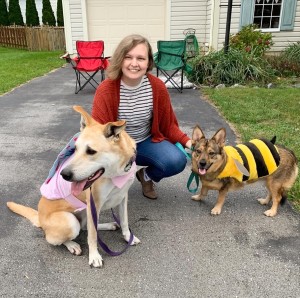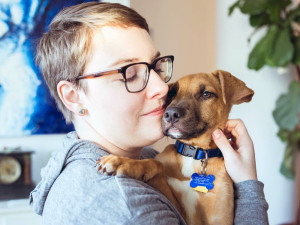What’s Stopping You From Fostering a Pet?
Here are six very good reasons why you should reconsider.

share article

Your pet wants you to read our newsletter. (Then give them a treat.)
Fostering a pet can be life-changing for not just animals, but the people who take the time to offer these dogs and cats a loving, if temporary, home. So many people are hesitant to foster for a variety of valid reasons, from worries about time commitment to a fear of getting overly attached.
The Wildest collected some of the most common fostering concerns from six different people. Then, we talked to Krista Almqvist, executive director at Badass Animal Rescueopens in a new tab in Brooklyn, about how to overcome these obstacles and become part of the life-saving work of fostering pets with their local shelter.
“Most people know that fostering saves lives, and giving a comfortable and transitional home to a pup in need is a rewarding experience,” Almqvist says. “Oftentimes, though, there are logistical and commitment fears that keep people from joining the fostering community. While some concerns are valid, there are plenty of myths we can debunk.”
And here are some of them.
“I get attached far too easily and would seriously struggle when it was time to say goodbye, even if that was a good thing.” — Sara, 38
Pet parents absolutely adore their cats and dogs, so it can be daunting to imagine providing a transitional home for an animal who will eventually end up with someone else. Almqvist notes that those feelings are normal and expected, but they shouldn’t stop individuals from fostering.
“This is the most common barrier we see,” Almqvist says. “And it will happen. You’ll love every dog that comes through your door and may get emotional when they’re finally adopted. It’s important to recognize how critical of a role you play in that dog’s journey to become adoptable and get a second chance at a new beginning.”
Almqvist suggests asking yourself a few questions to determine whether you would truly be the best fit longterm for your foster pet and figure out if your attachment to your foster is forever or just temporary:
Can you keep up with their energy? Can they keep up with you?
Does your foster have ongoing medical needs, and if so, can you afford to handle those needs as their full-time parent?
Does your foster need structure and a set routine? Does your schedule and lifestyle allow that?
What type of parent does your foster need? Are you that person?
“I worry it would be too stressful for my current pets to bring another pet into my home only temporarily.” — Amie, 32
Almqvist says current pets opens in a new tabshould always be a consideration when deciding to foster. Let the rescue know how many and what kind of pets are in your home, as well as their temperaments. The organization will work with you and choose a foster that gets along well with other animals. You may even be surprised by how your own pet takes to the new addition.
“I live in a small apartment.” — Olivia, 24
If you’re interested in fostering but worried about space, talk to your local rescue or shelter about your limitations. They will be happy to work with you to pair you with a foster pet that fits with your needs and will generally provide you with most of the supplies required, so you don’t have to stress about your budget, either.
“Badass covers the expenses of preventative care and medical treatments,” Almqvist says. “Most of the expenses a foster is expected to cover are food and dog-walking related, although we do have partners and supporters who give discounts or donate supplies.”
“I don’t have time to take care of a puppy or kitten.” — Julie, 33
Time commitment is a major concern — and for good reason. A pet is a huge responsibility, and it’s important to acknowledge that commitment. But Almqvist emphasizes that fostering and pet parenthood are two very different things.
“Being part of a foster network doesn’t mean you are being depended on 365 days a year,” she says. “You can take a break when you need it. Of course, when you bring a pet into your home for the first time, it’s important that you have the time to help acclimate them to their new environment, but you can then return to your normal schedule.”
“My job keeps me busy, and my partner and I both work outside the home.” — Courtney, 31
Every person’s life has different responsibilities and commitments, from career demands to family obligations. But you may be surprised how easily a foster pet could fit into your life.
“It’s true not everyone has time for a dog, and it’s incredibly important to recognize that having one is a commitment,” Almqvist says. “However, if you have time to donate, fostering is a great option. If you travel or occasionally need to be somewhere for work or other reasons, there are temporary fosters who can take your pup while you’re gone.”
“I had a bad fostering experience in the past.” — Kaitlin, 25
Not every pet is right for you. Sometimes, a fostering experience may not work out, and that’s OK. That’s why there is a network of other foster parents who can help you out and might be a better fit for that dog or cat. Don’t let one difficult experience stop you from providing an animal in need with a loving place to stay.
“Most, if not all, foster dogs are coming from stressful environments and shelters,” Almqvist says. “Whatever you can provide is likely going to be an improvement. However, you should also not expect to be placed with a dog that needs more than you can give.”
The Badass Foster Program (apply hereopens in a new tab!), and many programs around the country, allow you to specify your size and energy limitations and will then match you with a foster pet that fits your lifestyle.
“Being a foster is not for everyone, but ultimately, it’s not as difficult as it might seem,” Almqvist says. “There’s a whole network of support and flexibility to work within schedules, lifestyles, and experiences.”

Savannah Admire
Savannah Admire is a writer, editor, and pet parent to two dogs and a cat. When she’s not writing, you can find her reading, playing Animal Crossing, or being an obnoxious nerd about her favorite movies and TV shows. She lives in Maryland, where she constantly debates whether or not to get a third dog.
Related articles
![A woman with dark curly hair lifting a box with a plant in a pot balanced on top to another area in the home]() opens in a new tab
opens in a new tabHow to Prepare for an Adoption Home Visit
7 tips for acing your inspection and bringing your new pup home.
![A brunette woman holding a spotted gray kitten up to her face while its front paws rest on her chin]() opens in a new tab
opens in a new tab10 Foster-Fail Stories That Will Tempt You to Do the Same
Adopting a foster pet doesn’t isn’t always the right choice. But for these families, it turned out to be the only one.
![A tan dog sleeping on the couch while a short haired woman rests on her arms on the edge of the couch looking at the dog sadly]() opens in a new tab
opens in a new tabInflation Is Causing People to Surrender Their Pets
The time to foster is now.
![Couple hug their Pit Bull dog outside on the beach.]() opens in a new tab
opens in a new tabHow to Help the Rescue Pets Who Seem to Be Stuck at Shelters Forever
And why the problem of long-term rescue and foster animals persists.
![a person with short blonde hair and glasses hugs three rescue puppies and kisses one on the head]() opens in a new tab
opens in a new tabWhere Have All the Fosters Gone?
This is the Paula Cole parody that rescue orgs are singing as they struggle to find people to foster pets.
![Woman running with her cute spotted beagle while enjoying good weather and playing together in the city.]() opens in a new tab
opens in a new tabHow You Can Test the Waters of Pet Parenthood
How five aspiring pet parents are getting their feet wet by moonlighting as shelter volunteers and dog walkers.









